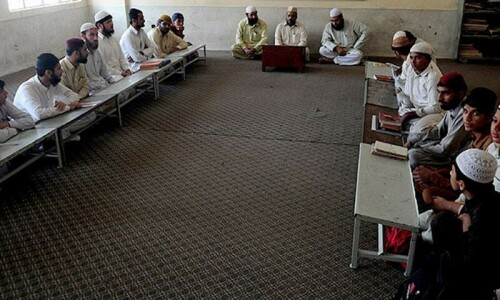ISLAMABAD: A “White Paper” on the process of judicial appointments to the superior judiciary has highlighted the need for the inclusion of women in the Judicial Commission of Pakistan (JCP) by amending Article 175-A of the Constitution.
Authored by four prominent lawyers, Faisal K. Daudpota, Reema Omer, Salaar Khan and Salahuddin Ahmed, and released on Friday, the document has made suggestions for bringing about improvements in the process of judicial appointments.
The paper, divided into two parts, first offers suggestions for reforms and then gives an explanation of the suggestions by citing as examples the experience of other countries.
A copy of the white paper was sent to Akhtar Hussain, who represents the Pakistan Bar Council in the Judicial Commission of Pakistan (JCP).
The discretion to appoint judges is too important a power to be left “unstructured and unfettered”, the document emphasises, adding that under the JCP Rules of 2010, the chief justice concerned proposes the name of a candidate for appointment. “But the rules are silent about the proper procedure,” the white paper says.
About the JCP’s composition, the paper suggests amending Article 175-A of the Constitution to allow the inclusion of the chairperson of the National Commission for Status of Women, an academic in the field of law and an academic outside the field of law.
The document also suggests the inclusion of a female advocate of the Supreme Court, to be nominated by the Supreme Court Bar Association (SCBA), in the Judicial Commission.
For the appointment of high court judges, the document suggests the inclusion in the commission of a female advocate with at least 15 years practice in a high court.
The bar association of the high court concerned will make the nomination, the white paper says.
It also proposes the representation of journalists, businesspersons, labourers and peasants in the commission.
Absence of women
The white paper laments that the commission consists solely of men at present and unless the rules are amended, it is unlikely that women would become part of it in the near future.
“This is because of the larger exclusion of women from top echelons of the legal profession,” the paper regrets. “All judges of the Supreme Court are men as are all chief justices and senior judges of the high courts; the federal and provincial law ministers are men; the attorney general for Pakistan is a man and most leaders of bar councils are men.”
This absence — or exclusion of women — has an adverse impact on the JCP’s credibility and is not sustainable, the white paper warns, calling for amending Article 175-A of the Constitution to allow the inclusion of women.
The white paper also calls for bringing transparency and objectivity to the process of filling judicial vacancies by emphasising that at least 15 per cent of all future appointees to the high courts should be women and at least five per cent should be non-Muslim.
For lawyers nominated to judicial posts, they must have to their credit at least 20 independently argued reported judgments in leading law journals. In addition, every JCP member should have the right to nominate one candidate for each available high court vacancy, the paper suggests.
Published in Dawn, January 8th, 2022














































Dear visitor, the comments section is undergoing an overhaul and will return soon.